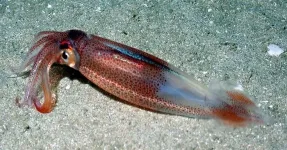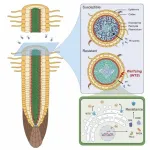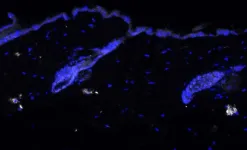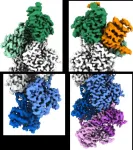(Press-News.org) Cephalopods are a large family of marine animals that includes octopuses, cuttlefish and squid. They live in every ocean, from warm, shallow tropical waters to near-freezing, abyssal depths. More remarkably, report two scientists at University of California San Diego in a new study, at least some cephalopods possess the ability to recode protein motors within cells to adapt “on the fly” to different water temperatures.
Writing in the June 8, 2023 edition of Cell, first author Kavita J. Rangan, PhD, a postdoctoral researcher in the lab of senior author Samara L. Reck-Peterson, PhD, a professor in the departments of Cellular and Molecular Medicine at UC San Diego School of Medicine and Cell and Developmental Biology at UC San Diego and an Investigator of the Howard Hughes Medical Institute, describe how opalescent inshore squid (Doryteuthis opalescens) employ RNA recoding to change amino acids at the protein level, improving the function of molecular motors that carry out diverse functions within cells in colder waters.
RNA recoding allows organisms to edit genetic information from the genomic blueprint to create new proteins. The process is rare in humans but is common in soft-bodied cephalopods, such as D. opalescens, which makes seasonal spawning migrations along the coast of San Diego.
“Cephalopods like D. opalescens are remarkable for their large nervous systems, body innovations and complex behaviors” said Rangan, “and their extensive use of RNA recoding has raised many questions about how this process might be involved in responding to environmental cues like temperature.”
In the new study, Rangan and Reck-Peterson looked at changes to a pair of proteins in squid cells that serve as molecular motors transporting a variety of intracellular cargoes along cellular highways called microtubules. Specifically, the researchers focused on molecular motor proteins called kinesin and dynein, both of which are fundamental to transportation within all cells, including neurons. In humans, mutations in both motors are linked to neurodegenerative diseases.
Working with live squid hatchlings at Scripps Institution of Oceanography, Rangan found that recoding of kinesin increased in animals as they experienced colder ocean water temperatures. Rangan then recreated recoded kinesin proteins using recombinant DNA technology and biochemistry. She then measured the movement of single motor molecules using advanced light microscopy and found that the recoded kinesin motors functioned better at cold temperatures.
“The work suggests that squid can tune their proteome (an organism’s entire complement of proteins) on the fly in response to changes in ocean temperature,” said Reck-Peterson. “One can speculate that this allows these marine ectotherms — animals that depend on external sources of body heat — to survive and thrive in a broad range of ocean temperatures.”
The scientists also found that RNA recoding varied across tissues, generating new kinesin variants with distinct movement properties.
“This work supports the idea that recoding in cephalopods is important for dynamically tuning protein function to support physiological needs and acclimate to changing environmental conditions” said Reck-Peterson. “These animals are taking a completely unique approach to adapting to their surroundings.”
Rangan said the findings also suggest the squid “editome” may be a valuable resource for highlighting regions of molecules that are amenable to plasticity or change. She is currently developing a database that includes the entire squid editome across different ocean temperatures.
“In highly conserved proteins, like kinesin and dynein, cephalopod recoding sites can point to overlooked residues of functional significance, said Rangan, “and this has broader implications for understanding basic protein function as well as for engineering proteins with specific functions. Cephalopods may be able to show us where to look and what changes to make.”
END
When water temperatures change, the molecular motors of cephalopods do too
RNA recoding is widespread in some animals, though not humans; UC San Diego researchers report squid employ it to dynamically alter key proteins to work better in colder water
2023-06-08
ELSE PRESS RELEASES FROM THIS DATE:
A potential milestone in cancer therapy
2023-06-08
Prostate cancer is the most common non-skin cancer in men worldwide. According to international estimates about one in six men will get prostate cancer during their lifetime and worldwide, over 375’000 patients will die from it each year. Tumor resistance to current therapies plays an essential role in this and new approaches are therefore urgently needed. Now an international research team from the University of Bern, Inselspital Bern and the University of Connecticut (USA) has identified a previously unknown weak spot in prostate cancer ...
Comparing doctors to peers doesn’t make them hate their jobs and may improve quality of care, new USC Schaeffer study finds
2023-06-08
June 8, 2023 — Showing people how their behavior compares to their peers is a commonly used method to improve behavior. But in the wake of a global pandemic that exacerbated health care providers’ job dissatisfaction and burnout, questions remain about the potentially negative effects of peer comparison on the well-being of clinicians.
A new study from the USC Schaeffer Center for Health Policy & Economics reveals fresh insights into the relationship between peer comparison and job satisfaction among clinicians. Published in JAMA Network Open, the study challenges prior findings that such feedback increases job dissatisfaction and burnout.
Researchers ...
Scientists discover how plants fight major root disease
2023-06-08
Researchers led by CHEN Yuhang and ZHOU Jianmin from the Institute of Genetics and Developmental Biology of the Chinese Academy of Sciences have shown how plants resist clubroot, a major root disease that threatens the productivity of Brassica crops such as rape.
The study, which uncovers novel mechanisms underlying plant immunity and promises a new avenue for crop breeding, was published in Cell.
Clubroot, a soil-borne disease, is the most devastating disease of Brassica crops. In China, approximately 3.2–4 million hm2 of agricultural land is affected by clubroot each year, resulting in a 20%–30% yield ...
The IL-17 protein plays a key role in skin ageing
2023-06-08
A team of researchers from IRB Barcelona and CNAG identifies the IL-17 protein as a determining factor in skin ageing.
Blocking the function of IL-17 reduces the pro-inflammatory state and delays the appearance of age-related features in the skin.
Published in the journal Nature Aging, the work opens up new perspectives in the development of therapies to improve skin ageing health.
A team of scientists from the Institute for Research in Biomedicine (IRB Barcelona) in collaboration with the National ...
University of Cincinnati study examines role of metabolites in disease treatment
2023-06-08
Each year, about 200,000 people in the United States are diagnosed with a bulge in the lower part of the aorta, the main artery in the body, called an abdominal aortic aneurysm (AAA).
New research from the University of Cincinnati examines the role a particular metabolite plays in the development of AAA and could lead to the first treatment of the condition.
The research was published in the journal Circulation.
“We started the study by examining whether AAA patients themselves had an increase in trimethylamine N-oxide (TMAO). We examined an American and Swedish ...
Study unravels the mysteries of actin filament polarity
2023-06-08
Actin filaments — protein structures critical to living movement from single cells to animals — have long been known to have polarity associated with their physical characteristics, with growing “barbed” and shrinking “pointed” ends. The ends of the filament are also different in the way they interact with other proteins in cells. However, the mechanism that determines these differences has never been entirely clear to scientists. Now, researchers from the Perelman School of Medicine at the University of Pennsylvania have revealed key atomic structures of ...
Colorful foods improve athletes’ vision
2023-06-08
Nutrition is an important part of any top athlete’s training program. And now, a new study by researchers from the University of Georgia proposes that supplementing the diet of athletes with colorful fruits and vegetables could improve their visual range.
The paper, which was published in Exercise and Sport Sciences Reviews, examines how a group of plant compounds that build up in the retina, known as macular pigments, work to improve eye health and functional vision.
Previous studies done by UGA researchers Billy R. Hammond and ...
Research puts lens on a new vision for land use decision making
2023-06-08
A new framework for making better and more transparent decisions about the use of our land could help to balance society’s demands upon it with protecting and enhancing the environment.
Researchers led by the University of Leicester have proposed a framework for decisions on land use, from nationwide policymaking to building happening at street level, that would involve the most representative range of stakeholders, from those with financial interests in the land to the local communities who use it and more besides.
Now published in the journal People and Nature, it encourages decisionmakers ...
'Most horrible’ brain tumor patients falling through healthcare cracks, study shows
2023-06-08
Patients suffering from the “most horrible” rare brain tumour are falling through the cracks of mental health provision, University of Essex researchers have found.
A recent study which interviewed patients and clinicians discovered survivors struggle to access therapy available for other serious illnesses, such as cancer, and there was a lack of specialised support.
For the first time, the mental health of British rare brain tumour patients was examined by psychologists and now researchers are calling for urgent changes to the health service.
Dr Katie Daughters hopes her findings –published in ...
Discovering cell identity: $6 million NIH grant funds new Penn Medicine research to uncover cardiac cell development
2023-06-08
PHILADELPHIA— Historically, scientists have studied how cells develop and give rise to specialized cells, such as heart, liver, or skin cells, by examining specific proteins. However, it remains unclear how many of these proteins influence the activity of hundreds of genes at the same time to turn one cell type into another cell type. For example, as the heart develops, stem cells and other specialized cells will give rise to heart muscle cells, endothelial cells (lining of blood vessels), smooth muscle cells, and cardiac fibroblasts. But the details of this process remain mysterious.
As a result of a $6 million, seven-year ...
LAST 30 PRESS RELEASES:
Antifibrotic drug shows promise for premature ovarian insufficiency
Altered copper metabolism is a crucial factor in inflammatory bone diseases
Real-time imaging of microplastics in the body improves understanding of health risks
Reconstructing the world’s ant diversity in 3D
UMD entomologist helps bring the world’s ant diversity to life in 3D imagery
ESA’s Mars orbiters watch solar superstorm hit the Red Planet
The secret lives of catalysts: How microscopic networks power reactions
Molecular ‘catapult’ fires electrons at the limits of physics
Researcher finds evidence supporting sucrose can help manage painful procedures in infants
New study identifies key factors supporting indigenous well-being
Bureaucracy Index 2026: Business sector hit hardest
ECMWF’s portable global forecasting model OpenIFS now available for all
Yale study challenges notion that aging means decline, finds many older adults improve over time
Korean researchers enable early detection of brain disorders with a single drop of saliva!
Swipe right, but safer
Duke-NUS scientists identify more effective way to detect poultry viruses in live markets
Low-intensity treadmill exercise preconditioning mitigates post-stroke injury in mouse models
How moss helped solve a grave-robbing mystery
How much sleep do teens get? Six-seven hours.
Patients regain weight rapidly after stopping weight loss drugs – but still keep off a quarter of weight lost
GLP-1 diabetes drugs linked to reduced risk of addiction and substance-related death
Councils face industry legal threats for campaigns warning against wood burning stoves
GLP-1 medications get at the heart of addiction: study
Global trauma study highlights shared learning as interest in whole blood resurges
Almost a third of Gen Z men agree a wife should obey her husband
Trapping light on thermal photodetectors shatters speed records
New review highlights the future of tubular solid oxide fuel cells for clean energy systems
Pig farm ammonia pollution may indirectly accelerate climate warming, new study finds
Modified biochar helps compost retain nitrogen and build richer soil organic matter
First gene regulation clinical trials for epilepsy show promising results
[Press-News.org] When water temperatures change, the molecular motors of cephalopods do tooRNA recoding is widespread in some animals, though not humans; UC San Diego researchers report squid employ it to dynamically alter key proteins to work better in colder water




